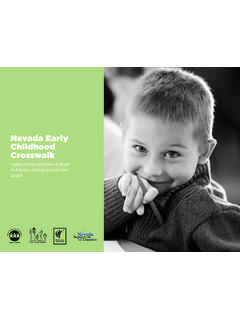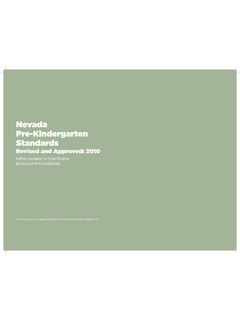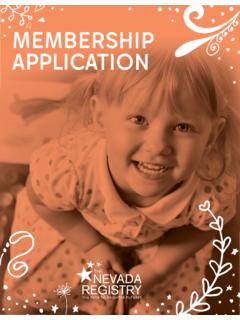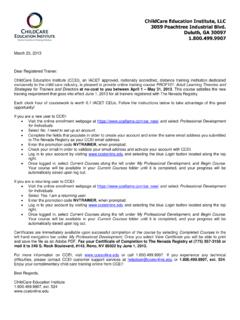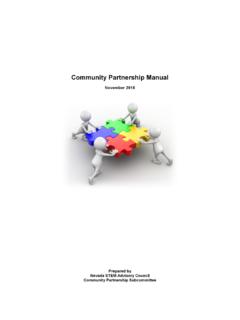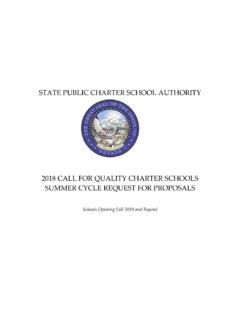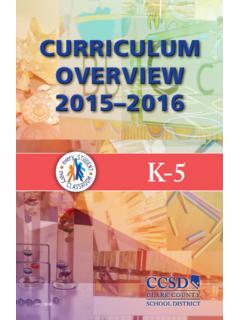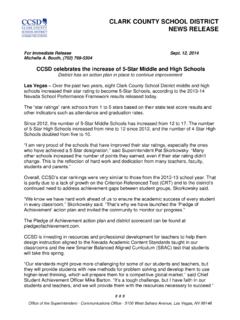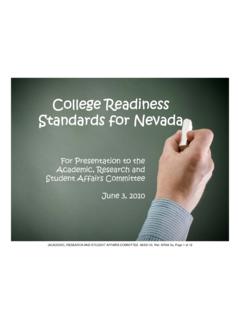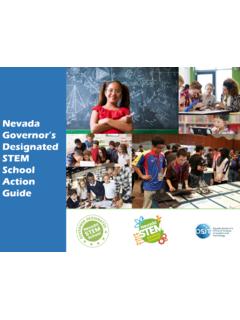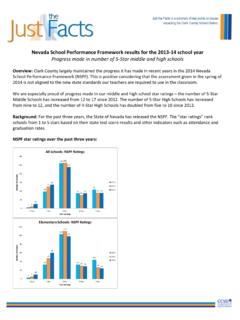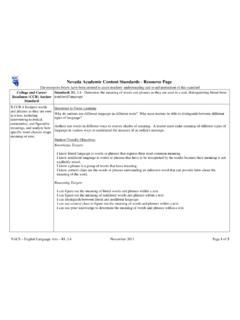Transcription of Nevada Pre-Kindergarten Standards
1 Building a Foundation for School Readiness and Success in Pre K-12 and BeyondNevada Pre-Kindergarten Standards Revised and Approved: 2010 This document is made possible through funding and support by1 Nevada State Board of EducationNevada State Board for Career and Technical EducationKeith RheaultSuperintendent of Public InstructionGloria Dopf, Deputy Superintendent Instructional Research and Evaluation ServicesGreg Weyland, Deputy SuperintendentFiscal and Administrative ServicesRorie Fitzpatrick, Director Office of Special Education, Elementary and Secondary Education, and School Improvement ProgramsNevada Department of EducationOffice of Special Education, Elementary and Secondary Education, and School Improvement Programs700 East Fifth Street, Suite 113 Carson City, NV 89701-5096(775) 687-9171 Fax (775) 687-9250 The State of Nevada is an equal opportunity employer and does not discriminate or deny services on the basis of race, color, national origin, sex, disability, and/or Wallace, PresidentGloria BonaventuraCraig WilkinsonAnnie Yvette WilsonDave Cook, ClerkStavan CorbettDr.
2 Cliff Ferry, Vice PresidentWillia ChaneySandy MetcalfAdriana FralickZhan Okuda-Lim, Ex Officio2 TABLE OF CONTENTSA cknowledgements .. 3 Thanks and Recognition .. 4 List of Acronyms .. 5 Nevada Pre-K content Standards Introduction .. 6 Purpose of the Pre-K Standards .. 6 History of the Nevada Pre-K Standards .. 8 Guiding Principles .. 9 Pre-K content Standards Format .. 11 Common Core Standards .. 12 Nevada s Early Childhood Comprehensive System .. 13 Professional Development System .. 15 Inclusive Learning Environments in Pre-K Programs .. 16 Culture, Diversity and 18 What is High Quality Pre-K? .. 18 School Readiness .. 19 Key to Standards Identification and Cross Referencing Links .. 20 Early Learning Guidelines and Pre-K Standards Alignment Crosswalk .. 21 Mathematics .. 22 Science .. 27 Language and Early Literacy .. 32 Social Studies / Social Emotional .. 42 Approaches to Learning: Creative Expression.
3 52 Physical Development and Health .. 67 Nevada K-12 content and Common Core Standards .. 77 Glossary .. 82 Appendix .. 87 References .. 1003 ACKNOWLEDGEMENTSThe Nevada Department of Education would like to thank the Nevada Pre-K content Standards Revision Committee for their hard work and contribution to this document. The revised document has been designed to be a useful tool to help teachers with planning and implementing the Standards into their curriculum. This document is also developed for parents. Material from the original parent and teacher guidebooks has been included in this document. Some of the original writing team members contributed to this revised version. 2010 Pre-K content Standards Revision CommitteeKathlene Banak*, Clark County School DistrictDr. Cheryl Brecheisen, College of Southern NevadaDr. Melissa Burnham, University Of Nevada , RenoMargot Chappel, Head Start CollaborationCindy Duarte, Clark County School DistrictDr.
4 Joanne Everts*, Washoe County School DistrictTracy Gruber*, Nevada Department of EducationSherry Halley*, Nevada Department of EducationStephanie Hartman*, Nevada Department of EducationLori Magnante, Western Nevada Community CollegeLynette Macfarlan, Great Basin CollegeCindy Johnson, State of Nevada - Office of Early Care and EducationShelly Nye*, The Nevada RegistryDawna Ogden, Washoe County School DistrictConnie Poulton*, Nevada Department of EducationPeggy Pulver*, Washoe County School DistrictSue Turbow, Truckee Meadows Community CollegeAnna Severens*, Nevada Department of EducationTina Schennum Springmeyer*, Nevada Pre-K Standards Crystal Swank, Truckee Meadows Community CollegeRichard Vineyard*, Nevada Department of EducationPrimary AuthorsTina Springmeyer, Nevada Pre-K Standards ProgramAnna Severens, Nevada Department of Education EditorTerry Randolph, Washoe County School District* Writing Team Participant4We would like to thank and recognize the Nevada Pre-K content Standards 2004 Original Writing Committee.
5 Keith Allred, Nevada Department of Education Rita Hemmert, Washoe County School DistrictMara Anderson, Kids Klub PreschoolJoelene Holmes, Calvary Baptist Church PreschoolNancy Kay Arnold, Cottonwood Elementary School Pat Hunter, McCaw Elementary SchoolGilda Austin, Clark County School DistrictCindy Johnson, State of Nevada - Office of Early Care and EducationKathy Biagi, Head Start State Collaboration Debby LaRocca, Clark County School DistrictDiane Branson, Special Children s Clinic Janie Lowe, Nevada Department of EducationJames Brandt, Nevada Department of EducationLori Magnante, Western Nevada Community CollegeMeg Burns, Lyon County School DistrictSally Martin, University of Nevada , Reno Cooperative ExtensionKaren Dickinson, Up and Away Learning Center Christine Matiash, State of Nevada - Office of Early Care and EducationCindy Duarte, Clark County School District Diane Neese, Clark County School DistrictLeanna Dyer, CSA Head StartDiane Nicolet, Truckee Meadows Community College Child Care CenterMary Eldridge, Little People s Head Start Rebecca Noveroske, The Child GardenEva Essa, University of Nevada , Reno Peggy Pulver, Washoe County School DistrictJoanne Everts, Washoe County School District Cheryl Rowe, Community College of Southern NevadaStacey Francois, Washoe Tribe of Nevada and California Head Start Paulette Scott, Economic Opportunity BoardDiane Hardy, Classroom on Wheels Cindy Sharp, Nevada Department of EducationPaula Hawkins, Bureau of Services for Child Care Barbara Sloan, Jacks Valley Elementary SchoolCrystal Swank, University of Nevada , Reno & Cooperative Extension Lynn Turner, Clark County School DistrictLaurel Swetnam, Southern Regional Early Childhood Services Mary Tyler, Pershing County School DistrictJoan Taylor, Nevada Department of Education Sherry Waugh.
6 University of Nevada , RenoSue Turbow, Truckee Meadows Community College Dan Weigel, University of Nevada , Reno Cooperative ExtensionTHANK YOU5 ARRA American Reinvestment and Recovery ActCCDF Child Care and Development FundCCSSO Council of Chief State School OfficersCKA Core Knowledge AreasCNAEA Consortium of National Arts Education AssociationsCSN College of Southern NevadaDEC Division for Early Childhood DHHS Department of Health and Human ServicesECAC Early Childhood Advisory CouncilECCS Early Childhood Comprehensive SystemECE Early Care and EducationELA Early Literacy ActivitiesELG Early Learning GoalsGBC Great Basin CollegeICC Interagency Coordinating CouncilIDEA Individuals with Disabilities Education ActIEP Individualized Educational ProgramIM Institute of MedicineIRA International Reading AssociationK-12 kindergarten through 12th GradeNAEYC National Association for the Education of Young ChildrenNASPE National Association for Sports and Physical Education
7 NCTM National Council of Teachers of MathematicsNDE Nevada Department of EducationNECTAC National Early Childhood Technical Assistance CenterNevAEYC Nevada Association for the Education of Young ChildrenNGA National Governors AssociationNRC National Research CouncilNIEER National Institute for Early Education ResearchPre-K Pre-KindergartenQRIS Quality Rating and Improvement SystemTMCC Truckee Meadows Community CollegeUNLV University of Nevada , Las VegasUNR University of Nevada , RenoWCSD Washoe County School DistrictWNC Western Nevada CollegeList of Acronyms6 Nevada Pre-Kindergarten content Standards IntroductionWelcome to the 2010 revised edition of the Nevada Pre-Kindergarten (Pre-K) content Standards , which provides the framework for curriculum and instruction in all of Nevada s Pre-K classrooms. The revised Standards include the content Standards as well as resources and materials that were previously printed in the teacher and family guidebooks.
8 The content Standards are used for planning curriculum, assessing growth and development, and for sharing important information with families. This document is a joint effort supported by the Nevada Department of Education s (NDE) Office of Special Education, Elementary and Secondary Education, and School Improvement Programs, aligning with the Nevada K-12 content Standards , as well as the Nevada Department of Health and Human Services (DHHS) and the Child Care and Development Fund (CCDF). Recent information about children s development and learning underscores the importance of high-quality early education and care. Research has revealed overwhelming evidence that young children are learning from their earliest months and years. We know that high-quality educational experiences have a positive impact on learning in later years. In addition, research has shown that young children who live in circumstances that increase their risk of school failure are much more likely to be successful in school if they participate in high-quality early learning programs.
9 As the nation looks to its future in a global society, especially to its need for an educated and skilled workforce, economists have also calculated the benefits of increased investments in early education. Their findings show a greater likelihood that young people will become economic and social contributors to society; that federal, state, and local governments will be able to reduce investments in remediation, incarceration, and welfare; and that a better-educated workforce will be able to support the nation s continuing economic growth (PreKNow 2009).Purpose of the Pre-Kindergarten StandardsThe Nevada Pre-K Standards describe appropriate outcomes for children at the end of their preschool experiences and entering kindergarten . Therefore, when reading the Standards one should think in terms of the child s final learning outcome before entering kindergarten . The Standards are guidelines to be used with all children in any early education setting, such as childcare centers, family childcare homes, Head Start, preschools and school district Pre-K programs.
10 As the importance of early childhood education continues to grow, new initiatives and research are recognizing Pre-Kindergarten as a foundation of school success. This paradigm shift can be seen by the following recent collaborations and focus on early childhood. The current administration, US Department of Education and US Department of Health and Human Services have a new level of collaboration with an unprecedented level of attention on early childhood. They are encouraging states to make early childhood a priority through recent initiatives such as the American Reinvestment and Recovery Act (ARRA), Race to the Top, Early Learning Challenge Grants, Early Childhood Advisory Councils, and P-20 Councils. P-20 can best be defined as a system in which education partners work together to align each level of education---preschool, elementary, middle school, high school, two-year and four-year colleges, and post-graduate education as well as workforce training.
